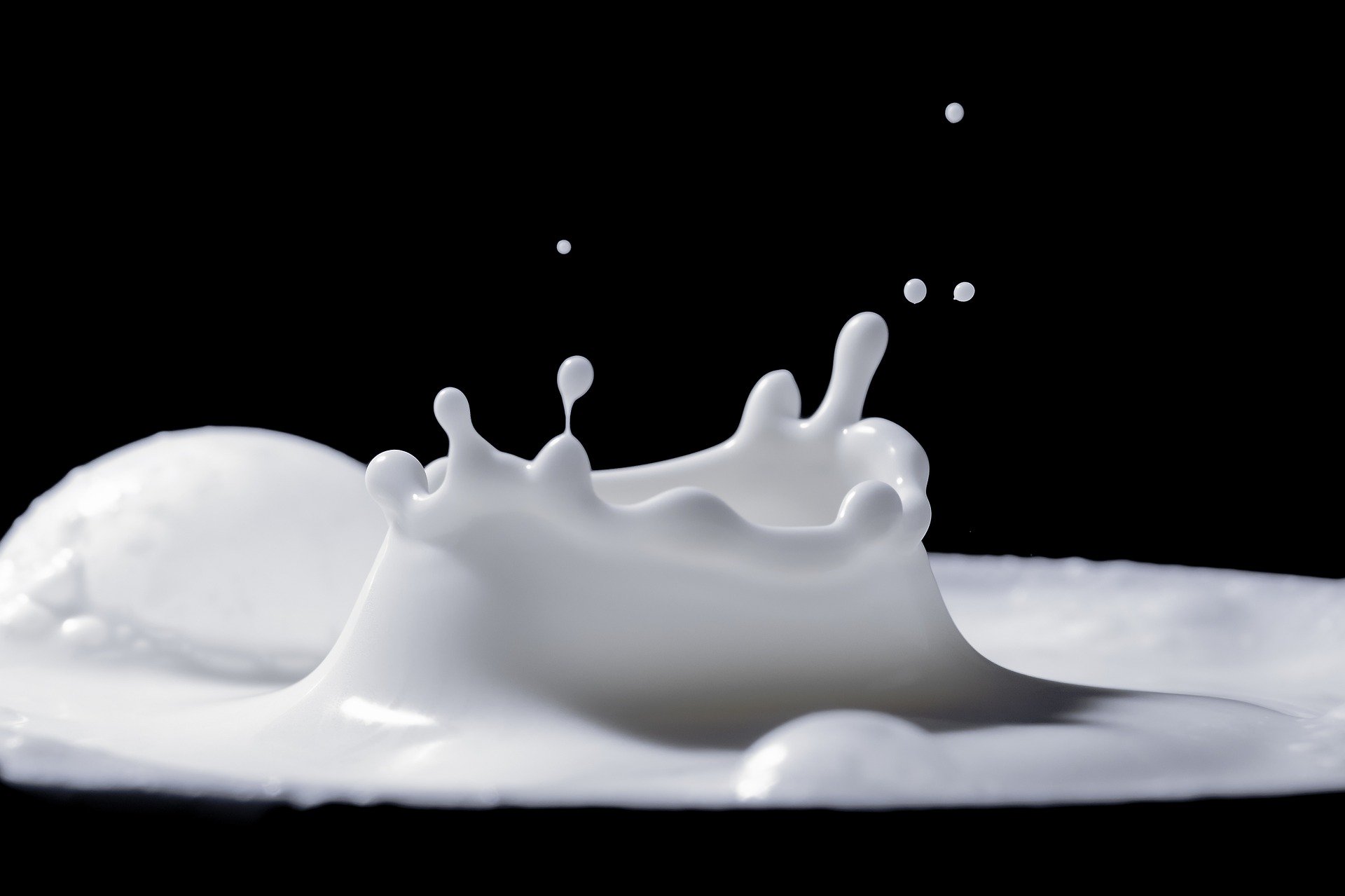Dairy is a controversial and confusing food group. Health organizations promote dairy as vital for improved bone health, yet other experts disagree and hail dairy as detrimental to health. Who is correct? Is dairy good or bad for your health? We examine the facts.
Let us know your opinion in the comments!
What do government health guidelines say? According to the United States Department of Agriculture (USDA) food MyPlate guidelines, to get all the nutrients you need from your diet, healthy food and beverage choices should be made from all five food groups, including fruits, vegetables, grains, protein foods, and dairy.
The dairy food group consists of all fluid milk products and many foods that are made from milk. The USDA recommended food choices from the dairy group should retain their calciumcontent and be low-fat or fat-free. Fat in milk, yogurt, and cheese that is not low-fat or fat-free will count toward your limit of calories from saturated fats.
While calcium-fortified soymilk is included as part of the dairy group, food products such as butter, cream, sour cream, and cream cheese are not included due to their low calcium content.
Daily dairy recommendations depend on your age. Children 2-3 years old require two cups of dairy per day, 4-8-year-olds need 2.5 cups per day, and three cups per day are recommended for age 9 and upward.
For people who do not consume dairy products, the USDA mention the following foods to contribute toward calcium intake: kale leaves, calcium-fortified juices, breads, cereals, rice or almond milk, canned fish, soybeans, other soy foods, such as tofu, soy yogurt, and tempeh, and some leafy greens including collard and turnip greens, kale, and bok choy.
They point out that the amount of calcium that is absorbed from these foods varies.
Nutrients in milk
Milk is a good source of calcium potassium, vitamin-D, and protein.
The USDA report dairy products are the primary source of calcium in the American diet. They also say that calcium helps to build bones and teeth, maintain bone mass, improve bone health, decrease the risk of osteoporosis and, what is more, diets that have an intake of three cups of dairy products per day can improve bone mass.
Furthermore, they note that dairy intake is particularly important to bone health during childhood and adolescence – a time when bone mass is being built.
Potassium in milk may help with maintaining blood pressure. Vitamin D helps the body maintain the correct calcium and phosphorous levels, which, in turn, contributes to building and maintaining bones. Dairy intake is also associated with a reduced risk of cardiovascular disease,type 2 Diabetes , and lower blood pressure.
The USDA highlight that it is important to choose low-fat or fat-free foods from the dairy group because foods high in saturated fats and cholestrol have adverse health implications. They say that diets high in saturated fats raise “bad” low-density lipoprotein (LDL) cholesterol in the blood. High LDL cholesterol increases the risk for coronary heart disease. Whole milk and many dairy products are high in saturated fat.
To help keep blood cholesterol levels healthy, the USDA recommended limiting the intake of foods high in saturated fat.
In summary, government guidelines say that milk is rich in nutrients. Calcium-rich low-fat or fat-free dairy products are essential for bone health, heart health, and type 2 diabetes, but full-fat dairy increases the risk for coronary heart disease. All sounds simple enough. So where does the controversy come in?
Is eating dairy ‘natural’?
It is often argued that dairy products should not be consumed since it is not “natural” to do so.
Cow’s milk is designed to provide all the protein, micronutrients, and fatty acids that calves need to grow in the same way that breast milk is designed to nurture human babies.
Not only are humans the only species that consumes milk as adults, but we are also the only species that drinks milk from other animals. Humans are not calves, and they have no need to grow, so why drink milk? Quite a convincing argument.
Dairy does not appear to be essential for humans from an evolutionary perspective and was not consumed until after the agricultural revolution. However, in some parts of the world, dairy has been consumed for thousands of years, and research has shown that genes have altered in humans to accommodate dairy consumption.
While consuming dairy may not have once been natural for humans, the evidence that shows that we have genetically adapted to eat dairy indicates that it may now be natural for us to eat and drink it.
Lactose intolerance
Another argument against dairy consumption is that around 75% of the world’s population and about 25 percent of the people in the U.S. lose their ability to produce digestive lactase enzymes sometime after weaning.
Lactase enzymes are present in infants and young children to help them break down and digest lactose – a sugar present in milk. A lack of lactase enzymes means that lactose cannot be split into glucose and galactose for absorption into the bloodstream, which results in lactose-intolerance.
After eating lactose-containing dairy products, people who are lactose intolerant experience abdominal bloating, pain, nausea, flatulence, and diarrhea. Some lactose intolerant individuals can eat fermented dairy, such as yogurt, or high-fat, dairy like butter.
Most people of Northern European ancestry can digest lactose with no problems whatsoever.
Full-fat dairy and cardiovascular disease
The USDA guidelines and conventional wisdom dictate that full-fat dairy increases the risk of heart disease due to its high saturated fat content.
The theory behind this idea is that saturated fat raises levels of LDL cholesterol in the blood, LDL cholesterol then lodges in the arteries, which causes atherosclorsis and eventually, heart disease. However, despite it being a dietary recommendation, this theory has never been proved and has been debunked in recent years.
A systematic review and meta-analysis published in the Annals of Internal Medicine and a meta-analysis published in The American Journal of Clinical Nutrition found no link between dietary saturated fat and an increased risk of coronary heart disease, stroke , and cardiovascular disease.
A study that used data from the Nurses’ Health Study – a long-term epidemiological study in the U.S. examining risk factors for major chronic disease in women – found that high intake of dairy fat is connected with a greater risk of coronary heart disease.
However, other studies have shown that full-fat dairy may protect against heart disease and stroke.
For example, research examining 10 studies that included full-fat dairy consumption showed that drinking milk might be associated with “a small but worthwhile reduction in heart disease and stroke risk.”
In grass-fed cows, full-fat dairy has been linked with a reduced risk of heart disease and stroke. One study indicated that people who consumed the most full-fat dairy had a 69 percent lower risk of cardiovascular death than individuals who consumed the least.
Research examining the role of dairy in heart disease is conflicting. However, heart disease risk seems to be significantly lower when consuming full-fat dairy in countries with grass-fed cows.
Does dairy benefit bone health?
Most health organization guidelines recommend an intake of two to three servings of dairy every day to ensure adequate calcium for bone health.
Some experts disagree with these guidelines because countries with higher dairy consumption have higher rates of osteoporosis than countries with lower intakes of dairy. However, it has to be noted that dairy consumption is not the only difference between these countries and does not conclude that dairy causes osteoporosis.
Two observational studies are often cited in the argument against consuming milk for bone health. The first study suggests that consumption of dairy products – particularly at the age of 20 years – is associated with a greater risk of hip fracture in old age. The second study found no evidence that intake of milk or calcium protects against hip or forearm fractures.
However, numerous studies support the benefits of dairy consumption for bone health. Research indicates that consuming dairy increases bone density and may prevent age-related bone loss and osteoporosis.
Randomized controlled trials are considered to be more reliable than observational studies and have shown in every age group that dairy improves bone health.
Dairy and calcium consumption leads to increased bone growth in children, decreases bone loss in adults, and improves bone density and lowers fracture risk in seniors.
Other than calcium, dairy provides other nutrients that are beneficial to bone health, such as protein and phosphorous, and Vitamin K-2 in full-fat dairy from grass-fed cows. Vitamin K-2 is a fat-soluble vitamin and is not present in low-fat and fat-free varieties of dairy products. Vitamin K-2 helps to regulate calcium metabolism, is vital for bone health, and may prevent heart disease.
Other conditions associated with dairy
Dairy has been linked to the development and prevention of many conditions and appears to cause and cure various diseases simultaneously. We check out the evidence behind these claims.
Obesity
Dairy products, and full-fat dairy products in particular, might be avoided due to concerns that these foods are fattening and may lead to obesity.
However, a study published recently in the American Journal of Clinical Nutrition determined that children who drink whole milk are leaner and have higher levels of vitamin D than those who drink the low-fat or skimmed varieties.
Type 2 diabetes
While flavored milk should be avoided with diabetes, there is no reason that people with diabetes should not consume dairy products.
In fact, research by Dr. Ulrika Ericson, of the Lund University Diabetes Center in Malmö, Sweden, and colleagues found that people who consumed the highest amounts of high-fat dairy products had a 23 percent lower risk of developing type 2 diabetes than individuals who consumed the least amount of dairy per day.
Harvard University found that teenagers who drink milk are 43 percent less likely to develop type 2 diabetes as adults compared with non-milk drinkers.
Prostate cancer
Some studies have found that a high dairy intake is associated with an increased risk of prostate cancer. One study reported that having higher intake of dairy increased the risk of prostate cancer by 32 percent. This greater risk may be linked to calcium levels.
In contrast, a study published in the British Journal of Cancer does not support the theory that high calcium intake increases the risk of prostate cancer.
Parkinson’s disease
Katherine C. Hughes, of the Harvard T.H. Chan School of Public Health, and collaborators have found an association between consuming at least three servings of low-fat dairy a day and risk of developing Parkinson’s disease.
“The results provide evidence of a modest increased risk of Parkinson’s with greater consumption of low-fat dairy products. Such dairy products, which are widely consumed, could potentially be a modifiable risk factor for the disease,” said Hughes.
The study authors stress that the findings do not mean that dairy products cause Parkinson’s disease, they just show a link between the two.
Depression
Opting for low-fat dairy rather than full-fat dairy reduces the risk of depression, according to Prof. Ryoichi Nagatomi, of Tohoku University in Japan, and team.
Adults who consumed low-fat milk and yogurt between one and four times per week were less likely to experience depression symptoms than those who reported no dairy consumption.
Brain health
People with higher intakes of dairy products have been shown to score significantly higher on memory and brain function tests than individuals who drink little or no milk.
The A2 type of beta-casein protein contained in cow’s milk is suggested to increase the body’s defenses against neurodegenerative diseases, pancreatitis, and cancer by raising an essential antioxidant in the body.
The jury is out on whether dairy is good or bad for you; the arguments for and against are ongoing, and the health effects vary between individuals. However, for the most part, evidence shows that dairy consumption has many benefits.




